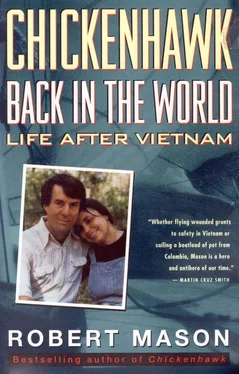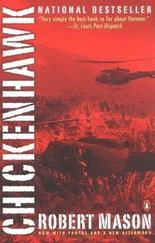Robert Mason - Chickenhawk - Back in the World - Life After Vietnam
Здесь есть возможность читать онлайн «Robert Mason - Chickenhawk - Back in the World - Life After Vietnam» весь текст электронной книги совершенно бесплатно (целиком полную версию без сокращений). В некоторых случаях можно слушать аудио, скачать через торрент в формате fb2 и присутствует краткое содержание. Год выпуска: 2013, Издательство: BookBaby, Жанр: Старинная литература, на английском языке. Описание произведения, (предисловие) а так же отзывы посетителей доступны на портале библиотеки ЛибКат.
- Название:Chickenhawk: Back in the World - Life After Vietnam
- Автор:
- Издательство:BookBaby
- Жанр:
- Год:2013
- ISBN:нет данных
- Рейтинг книги:3 / 5. Голосов: 1
-
Избранное:Добавить в избранное
- Отзывы:
-
Ваша оценка:
- 60
- 1
- 2
- 3
- 4
- 5
Chickenhawk: Back in the World - Life After Vietnam: краткое содержание, описание и аннотация
Предлагаем к чтению аннотацию, описание, краткое содержание или предисловие (зависит от того, что написал сам автор книги «Chickenhawk: Back in the World - Life After Vietnam»). Если вы не нашли необходимую информацию о книге — напишите в комментариях, мы постараемся отыскать её.
Chickenhawk: Back in the World - Life After Vietnam — читать онлайн бесплатно полную книгу (весь текст) целиком
Ниже представлен текст книги, разбитый по страницам. Система сохранения места последней прочитанной страницы, позволяет с удобством читать онлайн бесплатно книгу «Chickenhawk: Back in the World - Life After Vietnam», без необходимости каждый раз заново искать на чём Вы остановились. Поставьте закладку, и сможете в любой момент перейти на страницу, на которой закончили чтение.
Интервал:
Закладка:
At sunset John came back after one last call. The scam master, in California, was still undecided about when we should leave. We agreed with John that we should just get the hell out of here and see what happened. People at the marina were getting to know us; asked more and more questions. We were antsy to be moving.
Patience and Alice stood on the dock waving. I could feel a filament of attachment stretching to keep me there on that dock, but it got longer and longer and finally snapped. I waved until Patience was almost invisible, a tiny dark figure against the red sky.
CHAPTER 14
Wind gusts swirled among the buildings, buffeting us from random directions as we motored through the narrow shipping channels that go through Jacksonville. We honked our portable gas horn at a couple of drawbridges to make them raise them so the Namaste could get under. John had the weather radio on and we could hear that the seas outside were fifteen feet, winds thirty-five knots and increasing; but it seemed fairly peaceful in the channels that meandered through the city. John set Bob and me running around securing loose equipment. I tied the cabinet door handles together, which seemed unnecessary. I’d been living on the Namaste for a month and had become accustomed to her being a level and stable platform. I knew she would heel over in the ocean, but I couldn’t imagine her leaning far enough that stuff would fall out of the cabinets.
John asked me to crank up the loran. I went below and opened the electronics cabinet at the back of the counter where the loran was, next to the single-sideband radio—a radio that can communicate over very long distances. I tuned the loran and got a readout. I plotted the readout on our chart and found our position matched reality—Jacksonville inlet, right next to the Mayport Naval Station. I told John it was working fine. The loran was our primary navigational tool. These radios monitor transmissions from a bunch of shore stations and can pinpoint your position to within a hundred feet. They are truly marvels of technology.
We had an outgoing tide. When we hit the mouth of the inlet, the rushing water twisted into huge rolling furrows and the Namaste began bucking and yawing in the turbulence.
When we got clear of the inlet, the wind was howling at thirty-five knots. The Namaste bucked into huge breakers, shuddering like she’d run aground. The wind shrieked through the stays and shrouds. About two miles offshore, John announced it was time to set sail. Bob and I manned the mainsail and staysail winches under the dodger and John winched the jib halyard beside us. John let the boat weather-vane into the wind while we hoisted sail. The empty sails snapped and popped in the gale like big flags, sounding like bullwhips. You could feel the boat quiver with the shocks. It took less than a minute to get the sails up. John shut down the engine and let the Namaste fall off the wind. The sails filled and she heeled over, so fast that I thought she was going to be knocked down. The starboard gunwale went underwater and the Namaste lurched ahead, crashing through the surf. It was like a roller-coaster ride. John said that cruising with the gunwale underwater was called “putting the rail under.” For a neophyte, though, seeing the side of the boat go underwater was alarming.
John showed us how to adjust the sails. When you took up slack, pulled the sails tighter to the boat with the sheets, it was called sheeting in. Let them out, sheeting out. So John watched the sails and the rail and called, “Sheet out.” By sheeting out the sails, we took off some of the sideward pressure and got the rail out of the water, on average. The bigger waves crashed across the deck and poured into the cockpit. The sea was a fury of shoving dark shapes and we were in their way. We couldn’t see anything in the pitch-black night, just the water within a few feet of the boat that our dim red and green position lights illuminated. Waves crashed across the deck and slammed into the dodger. The dodger was just canvas and the only thing keeping water from cascading down the hatch. John tugged Rosalinda’s control lines, clicking the vane ratchet until the Namaste came to a course of about a hundred degrees east-southeast. We gave Rosalinda a little cheer as she held the Namaste on course against such massive forces.
We were soaking wet, crowded under the dodger. John asked me to check our position on the loran. I went below.
Above, in the cockpit, the rolling and wallowing hadn’t bothered me. It was difficult below decks. I began to feel nauseous immediately. The loran was on, its power light showed it was on, but the position readout lights were blank. I reset it and punched the readout button. Nothing. I went up and told John, over the howl of the sea, that the loran wasn’t telling me shit. Maybe he could get something out of it. He cursed the maker, Texas Instruments, and went below.
The cabin lights coming through the hatch made Ireland’s yellow slicker glisten. He cupped a joint against the wind and jutted his chin to the back of the boat. “That Rosalinda. How ‘bout that girl?”
I nodded. “Be hell having to man the tiller in weather like this.”
“Shit, Ali, manning the tiller is a drag in any kind of weather. You just sit there for hours pushing that stick back and forth to keep the fucking compass on track. I’ve tried lashing them down to hold a course, but that only works for a few minutes at a time. I’m real glad John insisted on getting her.” He blew a kiss at the autopilot. “I loooove you, Rosalinda!”
“Bob,” John yelled. We both looked. “I mean, Ali. I can’t get anything, either. See what you can do. You know more about electronic shit than I do.”
“Me? I’ve never even seen a loran before.”
John nodded. “See what you can do.”
As I went below, I saw Ireland lean over the side, barfing. The Namaste was plunging down huge water valleys that put my stomach in my throat and then crashing up the other side with a surge that stretched my scrotum. But I’d been in storms at sea before. My dad and I went through a hurricane in his forty-two-foot fishing boat when I was a kid. I’d spent a month on the USS Croatan on the way to Vietnam. I knew how long I could last before I puked. Below, without the reference of the dim horizon, there were no outside clues as to what was happening. The cabin was a grotesquely tilted room with shifting, unpredictable gravity. One instant I was pressed against the counter, the next I was flung against the stove. The wooden parts of the boat—the cabinets, the bulkheads, and the deck—creaked as the fiberglass hull flexed. I swallowed bile and clung to the chart counter, flipping every switch on the loran. I had it do a self-check, which said everything was okay. Everything was okay except that it wouldn’t give a position readout.
I went back up just as I was about to throw up. The wind and the spray washed the sickness away. I told John, “The fucker’s broken, John. Maybe when it calms down I can go into the engine compartment and check the antenna connections. That might be the problem.”
John nodded. “No problem.”
“No problem?” I said.
“Right. The most we’ll travel in a day is a hundred miles. This is a very big ocean, Bob. We steer this course for two days anyway. You can get it working tomorrow.”
I nodded. Maybe.
Nobody wanted to go below because it made you sick. We’d drawn straws for the watches—or rather, Ireland and I had drawn straws. John wanted the four-to-eight watch so he could catch the sunrise for navigation. Ireland got the twelve-to-four, leaving me with the eight- to-twelve. The watches were four hours on, eight hours off, twice a day. I’d gotten the easy watch: eight to twelve in the morning, eight to twelve at night. We’d stick to that pattern for the whole trip. It was eight o’clock, my watch for another four hours, but John and Ireland stayed in the cockpit.
Читать дальшеИнтервал:
Закладка:
Похожие книги на «Chickenhawk: Back in the World - Life After Vietnam»
Представляем Вашему вниманию похожие книги на «Chickenhawk: Back in the World - Life After Vietnam» списком для выбора. Мы отобрали схожую по названию и смыслу литературу в надежде предоставить читателям больше вариантов отыскать новые, интересные, ещё непрочитанные произведения.
Обсуждение, отзывы о книге «Chickenhawk: Back in the World - Life After Vietnam» и просто собственные мнения читателей. Оставьте ваши комментарии, напишите, что Вы думаете о произведении, его смысле или главных героях. Укажите что конкретно понравилось, а что нет, и почему Вы так считаете.












